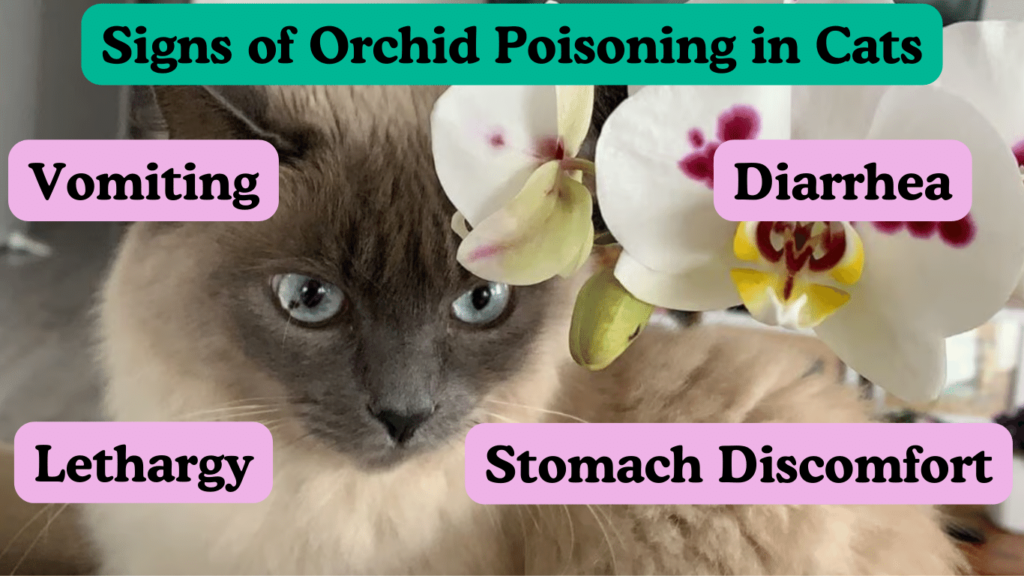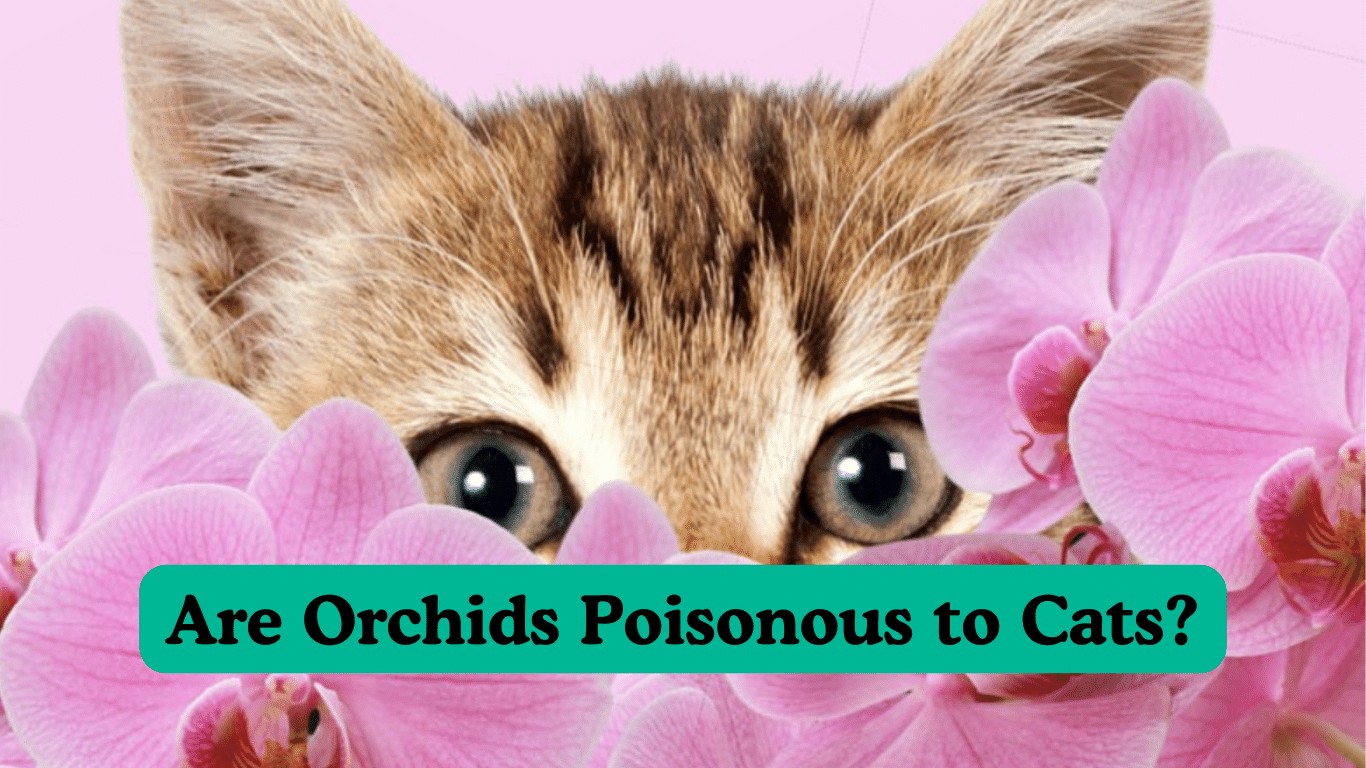Introduction
Ever wondered if those elegant orchids pose a danger to your curious cat? Let’s explore the truth behind this common concern. In this short read, we’ll unravel the mystery of, “are orchids poisonous to cats”. Stick around to ensure a safe and harmonious environment for both your floral beauties and furry companions.
Table of Contents
Understanding Orchids and Their Toxicity
Common Orchid Varieties
Orchids are a diverse and beautiful family of flowering plants, with numerous varieties that are popular among gardening enthusiasts. Below are some common varieties of orchids:
- Phalaenopsis: This variety is known for its elegant, long-lasting blooms and is a popular choice for indoor cultivation. It comes in a wide range of colors, including white, pink, and purple.
- Dendrobium: Dendrobium orchids are characterized by their cane-like stems and vibrant, showy flowers. They are relatively easy to care for and are available in various colors and sizes.
- Cattleya: Cattleya orchids are prized for their large, fragrant, and intricately patterned flowers. They require bright light and warm temperatures to thrive and are often used in corsages and floral arrangements.
- Oncidium: Oncidium orchids, also known as
Toxic Components in Orchids
While orchids are known for their elegance, some varieties contain toxic components that can pose a threat to household pets. Understanding these toxic components is crucial for pet owners to ensure a safe environment for their feline companions. Let’s dive deeper into the specific toxic components found in certain orchid varieties:
- Alkaloids: Orchids can contain alkaloids, which are nitrogen-containing compounds known for their bitter taste and toxic effects. These compounds can have varying levels of toxicity and may cause adverse reactions if ingested by cats, such as vomiting, diarrhea, and in severe cases, central nervous system depression.
- Glycosides: Some orchids also contain glycosides, which are sugar compounds linked to other non-sugar molecules. Glycosides can have cardiac effects, and cats that ingest orchids containing glycosides may experience symptoms such as irregular heartbeats, weakness, and lethargy.
Additionally, certain orchid species may contain other compounds that could be harmful to pets, so it’s essential for pet owners to research the specific toxicity of the orchid varieties they have in their homes. By being knowledgeable about the potential dangers, pet owners can take proactive measures to safeguard their feline companions and create a pet-friendly environment.
Symptoms of Orchid Poisoning in Cats
Orchid poisoning in cats can manifest through various symptoms, including:
- Vomiting
- Diarrhea
- Stomach Discomfort
- Lethargy
In addition to these symptoms, cats may also exhibit:
- Excessive drooling
- Loss of appetite
- Weakness
- Difficulty breathing
- Increased heart rate
If a cat shows signs of orchid poisoning, it’s crucial for cat owners to seek prompt veterinary care. Understanding these symptoms can help mitigate the impact of orchid toxicity on feline health.
Preventing Orchid Poisoning in Cats
Safe Orchid Varieties for Homes with Cats
For households with cats, selecting safe orchid varieties is crucial to prevent poisoning incidents. While many orchid varieties can be harmful to cats if ingested, there are some safer options that cat owners can consider introducing to their homes. It’s important to note that even safe orchids should be kept out of reach of curious felines to avoid potential mishaps.
- Scientific Name: Phalaenopsis
- Toxicity Level: Low
- Description: Moth Orchids, also known as Phalaenopsis, are popular for their elegant and long-lasting blooms. These orchids are generally safe for homes with cats and pose minimal risk if ingested. They come in a variety of colors and patterns, making them a beautiful and cat-friendly addition to any living space.
- Scientific Name: Paphiopedilum
- Toxicity Level: Low
- Description: The Lady Slipper Orchids, or Paphiopedilum, are another safe option for cat-friendly households. These unique orchids feature distinct pouch-like blooms and are known for their resilience and ease of care. They are non-toxic to cats and can thrive in indoor environments, adding a touch of exotic beauty to the home while ensuring pet safety.
When selecting orchids for homes with cats, it’s essential to research specific varieties and ensure they are non-toxic to felines. Additionally, placing orchids in elevated or enclosed spaces can help prevent unintended interactions between curious cats and delicate blooms, creating a harmonious environment for both pets and plant enthusiasts.

Tips for Keeping Orchids Away from Cats
Implementing preventive measures to keep orchids away from cats is essential for maintaining a safe living environment. Placing orchids in elevated or enclosed spaces, using deterrent sprays, and providing alternative enrichment for cats can help reduce the risk of orchid poisoning incidents. These proactive steps contribute to a cat-friendly home with reduced exposure to toxic orchids.
What to Do If Your Cat Ingests Orchid
If a cat ingests orchids or shows signs of potential poisoning, immediate action is necessary. Contacting a veterinarian for professional guidance, monitoring the cat’s symptoms, and providing relevant information about the ingested orchid variety can aid in prompt and effective treatment. Timely intervention is critical in addressing orchid poisoning in cats and safeguarding their well-being.
Are Orchids Poisonous to Cats?
Factors Affecting Toxicity
The toxicity of orchids to cats is influenced by various factors, including the specific orchid species, the quantity ingested, and the sensitivity of individual cats. Understanding these factors helps in assessing the potential risk of orchid poisoning and implementing appropriate preventive measures to protect cats from exposure to toxic orchids.
Ways Cats May Come in Contact with Orchids
Cats may come in contact with orchids through various means, including nibbling on plant leaves, knocking over potted orchids, or exploring indoor garden spaces. Awareness of these potential interactions enables cat owners to identify and address opportunities for preventing orchid poisoning incidents and promoting feline safety within the home environment.
Effects of Orchid Poisoning in Cats
Orchids are known for their beautiful and alluring appearance, but they can pose significant health risks to cats when ingested. Orchid poisoning in cats can lead to various adverse effects, ranging from mild gastrointestinal disturbances to potential systemic toxicity. It is crucial for cat owners to recognize the effects of orchid poisoning and take proactive measures to safeguard their pets’ well-being.
- Vomiting: Cats may experience recurrent vomiting after ingesting orchids. This can indicate the body’s attempt to expel the toxic elements present in the plants.
- Diarrhea: Gastrointestinal upset, including diarrhea, is a common sign of orchid poisoning in cats. It can lead to dehydration and discomfort in affected cats.
- Discomfort: Cats may exhibit signs of discomfort, such as restlessness, lethargy, and refusal to eat, after ingesting orchids. This can be an indication of the toxic effects on their internal systems.
In severe cases of orchid poisoning, cats may experience systemic effects that affect various organs and bodily functions. These can include:
- Cardiovascular Issues: Orchid toxicity can impact the heart and circulation, leading to irregular heartbeat and cardiovascular distress in cats.
- Respiratory Complications: Inhalation of orchid toxins or systemic absorption can result in respiratory distress and labored breathing in affected cats.
- Neurological Symptoms: Some orchid species contain compounds that can affect the nervous system, leading to neurological symptoms such as disorientation, tremors, and seizures.
To mitigate the risk of orchid poisoning in cats, it is essential to implement the following preventive measures:
- Education: Cat owners should be aware of the potential dangers of orchids and understand the specific toxic components that may harm their pets.
- Placement: Store orchids in areas that are inaccessible to cats, such as high shelves or rooms with restricted access.
- Supervision: When introducing new plants, including orchids, into the household, closely supervise cats to prevent inadvertent ingestion.
- Prompt Veterinary Care: If orchid poisoning is suspected, prompt veterinary attention is crucial to minimize the adverse effects and provide appropriate treatment.
Conclusion
In conclusion, understanding the potential toxicity of orchids to cats is essential for responsible pet ownership. By recognizing the common orchid varieties, toxic components, symptoms of poisoning, and preventive measures, cat owners can create safer living spaces for their beloved pets.
Being mindful of the impact of orchid poisoning and taking proactive steps towards prevention fosters a harmonious coexistence between cats and orchids. Remember, a cat-friendly environment is one that prioritizes safety and well-being.

